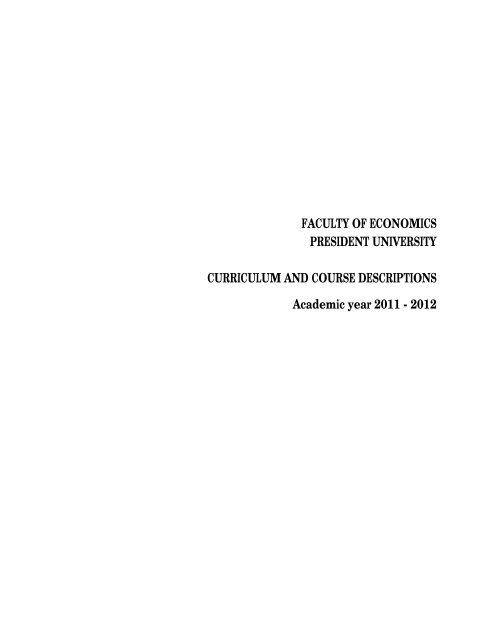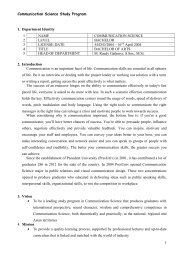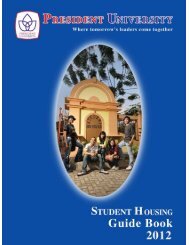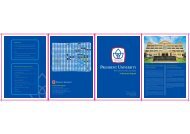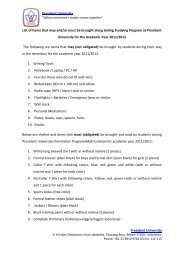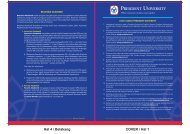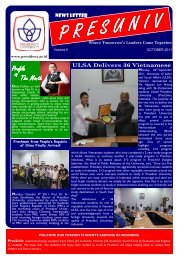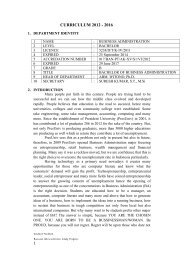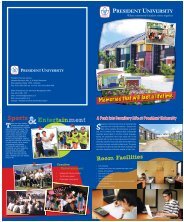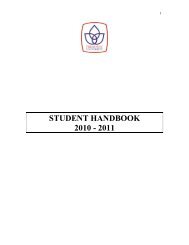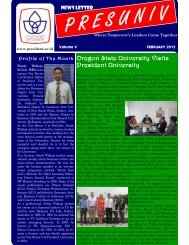Curriculum - President University
Curriculum - President University
Curriculum - President University
Create successful ePaper yourself
Turn your PDF publications into a flip-book with our unique Google optimized e-Paper software.
FACULTY OF ECONOMICS<br />
PRESIDENT UNIVERSITY<br />
CURRICULUM AND COURSE DESCRIPTIONS<br />
Academic year 2011 - 2012
FACULTY OF ECONOMICS<br />
Vision and Mission<br />
Vision :<br />
To be the best and leader Faculty of Economics in Indonesia with supporting International curriculum<br />
and recognition in Economic, Management and Accountancy sectors.<br />
Mission :<br />
1. To produce graduates who will become future leaders and professionals in economic sectors<br />
whether national or international level that has strong management and accountancy skills<br />
that highly respect Ethics, Attitude and Integrity.<br />
2. To become the leader of international curriculum with supporting research development in<br />
Economic, Management and Accountancy field.<br />
3. To develop human resource especially students in skills and knowledge by expanding<br />
relationship with many international and national companies or institutions.<br />
Organizational Structure<br />
Rector<br />
Dean<br />
Vice Dean: I, II, III<br />
Accounting Study Program<br />
Head & Secretary<br />
Management Study Program<br />
Head & Secretary<br />
Admin Staff<br />
Admin Staff<br />
Accounting Lab<br />
Lecturers<br />
Tax Center &<br />
Investment<br />
Gallery<br />
Management Lab<br />
Lecturers<br />
2
List of Lecturers<br />
Full time<br />
No. Nama Email<br />
1. Misbahul Munir, Ak., MBA mr_m4322@yaho.com<br />
2. Irfan Habsjah, MBA, CMA irfanhabsjah@yahoo.com<br />
3. Ir. Erny E. Hutabarat, MBA ernyeh@gmail.com<br />
4. Ir. Edi Supriyadi, MBA edyyadi2@gmail.com<br />
5. Ir. B.M.A.S. Anaconda Bangkara, MT ienjo2004@yahoo.com<br />
6. Maria Jacinta Arquisola, MMGT-HRM Jacinta_arquisola@yahoo.com<br />
7. Drs. Bruno Rumyaru, M.A brunorumyaru@yahoo.com<br />
8. T. Manivasugen, MBA, D.I.S.M tmg_ibm@yahoo.com<br />
9. Aditia Rusmawan arusmawan79@yahoo.com<br />
10. Dr. Erwin Ramedhan erwinramedhan@gmail.com<br />
11. Drs. Jozef Raco, MS. Msc reckyraco@yahoo.com<br />
12. Purwanto, ST, MM pur71wanto@yahoo.com<br />
13. Ir. Yunita Ismail, M.Si yunitaismail@yahoo.co.id<br />
14. Dra. Genoveva, M.M genoveva.claudia@gmail.com<br />
15. Iman Heru Wijayanto, MBA jenanggulo@gmail.com<br />
16. Sonny Vinn Sutedjo, SE, MM saham888@yahoo.com<br />
17. Suresh Kumar, ST, M.Si tb7976sk@yahoo.com<br />
18. Miftah Zikrie, M.Sc miftah.zikrie@president.ac.id<br />
19. Dr. Karan Singh salogda@cbn.net.id<br />
20. Nil Sonata, M.H nilsonata@yahoo.com<br />
21. Faisal Abdullah, SE, MBA aanthur@yahoo.com<br />
3
Part time<br />
No. Nama Email<br />
1. Choirul Anwar , MBA, MAFIS anwar_choirul@yahoo.com<br />
2. Ilham Wardhana Siregar, MM, CFP ilhamws@gmail.com<br />
3. Ading Fadhil, MM, M.Acc, Ak. adingf@gmail.com<br />
4. Evi Steelyana, SE, Ak., MM evi.wiyarto@gmail.com<br />
5. Nur Abdillah<br />
6. Mairizal Chaidir<br />
7. Alex Iskandar Munaf, MA, PhD alexismunaf@yahoo.com<br />
8. Dipl.Industrie – Designer Osriman Oesman osriman@gmail.com<br />
9. Margaretha TP Lingga, SE, Pg. Cert mtp_lingga@yahoo.co.uk<br />
10. Eka Juliansjah B, SH, M.Com ekabudhiman@gmail.com<br />
11. Diana Widyastuti, MLS Diana.widyastuti@yahoo.com<br />
12. Ir. Wisnu Dewobroto, MSc<br />
13. Dra. Aris Miyati, MA<br />
14. Berthold Raja Puruba, SE, MSM bertholdrajapurba@gmail.com<br />
15. Iskandar Zulkarnaen<br />
16. Ahalik SE, Ak, M.Si, CMA, CPMA ahalik_ui@yahoo.com<br />
17. Hairun Gani, B.Sc, MBA hairungani@yahoo.com<br />
18. Umar Subandijo<br />
4
The Faculty of Economics has two major study programs: Accountancy and Management. Each of these<br />
programs specifies the total numbers of credit that are required to be taken to complete this degree.<br />
MANAGEMENT Study Program<br />
<strong>Curriculum</strong><br />
Below is a guide on the required number of credits for each of the teaching categories in Management.<br />
No. Subjects Category Credits<br />
1. General Subjects 21<br />
2. <strong>University</strong> Core 30<br />
3. Faculty Core 39<br />
4. Study Program 24<br />
5. Concentration 30<br />
Banking and Finance 30<br />
Hotel and Tourism Management 30<br />
Human Resource Management 30<br />
International Business 30<br />
Marketing 30<br />
Total Number of Credits 144<br />
1. General Subjects<br />
No. Code Subject Title Credits<br />
1 English 1 3<br />
2 English 2 3<br />
3 English 3 3<br />
4 English 4 3<br />
5
5 Citizenship & State Philosophy 3<br />
6 Indonesian Language 3<br />
7 Religion 3<br />
Total Number of Credits 21<br />
2. <strong>University</strong> Core<br />
No. Code Subject Title Credits<br />
1 Entrepreneurship 3<br />
2 Business Ethics 3<br />
3 Internship 1 3<br />
4 Internship 2 3<br />
5 Introduction to Communication 3<br />
6 Leadership 3<br />
7 Intro to Business & Management 3<br />
8 Principles of Marketing 3<br />
9 Thesis 6<br />
Total Number of Credits 30<br />
3. Faculty Core<br />
No. Code Subject Title Credits<br />
Business Law 3<br />
Business Statistics 3<br />
Financial Management 1 3<br />
Financial Management 2 3<br />
6
Human Resource Management 3<br />
Economics 3<br />
Introduction to International Business 3<br />
Mathematics of Business 3<br />
Principles of Accounting 1 3<br />
Principles of Accounting 2 3<br />
Production and Operation Management 3<br />
Research Methodology 3<br />
Strategic Management 3<br />
Total Number of Credits 39<br />
4. Study Program<br />
No. Code Subject Title Credits<br />
1. Business Plan Development 3<br />
2. Managerial Accounting 3<br />
3. Managerial Economics 3<br />
4. International Management 3<br />
5. Interpersonal Skill 3<br />
6. Management Information Systems 3<br />
7. Organization Behavior 3<br />
8. Financial Statement Analysis 3<br />
Total Number of Credits 24<br />
5. Concentration Course<br />
INTERNATIONAL BUSINESS<br />
7
No. Code Subject Title Credits<br />
1 Introduction to International<br />
Economics<br />
3<br />
2 Economics Theory of Globalization 3<br />
3 International Investment Law 3<br />
4 International Financial Institutions and<br />
Organizations<br />
5 International Public and Corporate<br />
Finance<br />
3<br />
3<br />
6 International Trade 1 3<br />
7 International Trade 2 3<br />
8 International Marketing 3<br />
9 Supply Chain Management 3<br />
10 International Transportation & Logistics 3<br />
Total Number of Credits 30<br />
BANKING and FINANCE<br />
No. Code Subject Title Credits<br />
1 General Banking Theory 3<br />
2 Fundamentals of Investment 3<br />
3 Bank Management and Operation 3<br />
4 International Financial Institutions and<br />
Markets<br />
5 Investment Analysis and Portfolio<br />
Management<br />
3<br />
3<br />
8
6 Risk Management and Insurance 3<br />
7 Corporate Finance 3<br />
8 Public Finance 3<br />
9 International Finance 3<br />
10 Financial Modeling 3<br />
Total Number of Credits 30<br />
MARKETING<br />
No. Code Subject Title Credits<br />
Sales and Retail Management 3<br />
Consumer Behavior 3<br />
Advertizing and IMC 3<br />
E-Marketing 3<br />
International Marketing 3<br />
New Product Planning & Development 3<br />
Marketing Research 3<br />
Brand Management 3<br />
Service Marketing 3<br />
Strategic Marketing 3<br />
Total Number of Credits 30<br />
HUMAN RESOURCE MANAGEMENT<br />
No. Code Subject Title Credits<br />
Recruitment and Selection 3<br />
Training and Development 3<br />
Compensations and Benefits 3<br />
9
Organizational Theory and Design 3<br />
Industrial Relations 3<br />
Industrial Psychology 3<br />
Occupational Safety and Health 3<br />
Performance Management 3<br />
Organization Development 3<br />
Competency-Based HRM 3<br />
Total Number of Credits 30<br />
HOTEL and TOURISM MANAGEMENT<br />
No. Code Subject Title Credits<br />
Intro to Global Hospitality & Tourism 3<br />
Rooms Division Management 3<br />
Managing & Organizing Conferences<br />
and Exhibitions<br />
3<br />
Tour & Travel Management 3<br />
Basic Cuisine 3<br />
Intermediate Cuisine 3<br />
Superior Cuisine 3<br />
Bakery & Pastry 3<br />
Kitchen Operations Management 3<br />
Food & Beverage Service 3<br />
Total Number of Credits 30<br />
Course Description<br />
10
GENERAL SUBJECT<br />
1. English 1: English for Spoken Communications (Listening & Speaking)<br />
This course aims to explore and expand the students’ proficiency to express and convey their message and<br />
intentions in both intelligible and comprehensible spoken English. In this course the students are also introduced and<br />
exposed to varieties of social interactions, situations and contexts for them to communicate effectively. In a class<br />
where International students are present, the course will provide the opportunity for the students to be exposed to<br />
World English and, thus, become aware of identity considerations and cultural sensitivity.<br />
2. English 2: English for Written Communications (Reading & Writing)<br />
This course aims to explore and enrich the students’ proficiency to express and convey their ideas and intentions in<br />
comprehensible written English. In this course the students are also introduced and exposed to varieties of texts and<br />
contexts for them to evaluate and to communicate effectively in written mode. In a class where International students<br />
are present, the course will provide the opportunity for the students to be exposed to World Englishes and, thus,<br />
become aware of identity considerations and cultural sensitivity.<br />
3. English 3: English for Professional Context<br />
This course aims to explore the students’ ability in the professional settings. In this course, the students are also<br />
practicing the use of English in the key areas of business communication which include planning, analyzing, writing<br />
and negotiate the meaning of business texts and contexts.<br />
4. English 4: English for Academic Purposes<br />
This course aims to explore the students’ competencies in planning, researching, organizing, drafting and producing<br />
Academic papers. In this course, the students are also learning how to cite and reference in Academic Writing to<br />
avoid plagiarism.<br />
5. CITIZENSHIP and STATE PHILOSOPHY<br />
This course covers the principles of Citizenship, nationality, pattern of thought, primary of<br />
Citizenship towards internationalism and regionalism as well as its implementation in actual society.<br />
The principles and regulations of Citizenship are reflected in a critical way so that it can answer the<br />
recent problems of people citizenship.<br />
This course covers the principle of Pancasila, UUD 1945, and GBHN, patterns of thought, primary of<br />
Pancasila amidst liberalism and socialism as well as its implementation in actual society. The<br />
principles of Pancasila are reflected in a critical way so that it can answer the recent problems of<br />
society.<br />
6. INDONESIAN LANGUAGE<br />
This course provides the students with the language skills in order to develop their Indonesian<br />
communicative competence in a formal context such as writing papers and thesis and public speaking<br />
through practice and careful analysis of its vocabulary choice, grammar use, logical paragraph and<br />
essay writing with correct spelling. This course is intended to help Indonesian and foreign students<br />
develop their communicative knowledge, competences and skills so they are able to communicate in<br />
their daily activities with the local community.<br />
7. RELIGION<br />
11
This course covers religiosity, essence of religion. Learning to live together and dialog among<br />
religions, intercultural and multi-religions approach. It also takes into account philosophical,<br />
phenomenological consideration on religion.<br />
UNIVERSITY CORE<br />
1. ENTERPRENEURSHIP<br />
This course covers the principles and practices of entrepreneurship in the business world. Theories<br />
on principles of entrepreneurship such as definition, tips on the key to success, challenges, creative<br />
thinking will be covered. Developing a business plan will be an essential part of the course. The<br />
entrepreneurial profile will also be discussed. Cases on successful entrepreneurs are highlighted to<br />
provide example on how they were able implement strategies and efforts in achieving success.<br />
2. BUSINESS ETHICS<br />
This course provides student with background information about the role of ethics in the business<br />
and daily life of an individual as a person and as a member of the society. It is the application of our<br />
understanding of what is good and right to that assortment of institutions, technologies,<br />
transactions, activities, and pursuits that we call business. Business transactions are for the most<br />
part carried out within market structures. We need to examine the ethical aspects of the market<br />
activities. The process of producing goods forces businesses to engage in exchanges and interactions<br />
with two main external environments: the natural environment and a consumer environment. We<br />
need to explore the ethical issues raised by these exchanges and interactions..<br />
3. INTERNSHIPS (Phase 1 and Phase 2)<br />
Students will learn hands-on work experience for a company or several companies during the course<br />
of 8 months. Student eligibility to this program is guided by <strong>University</strong> policies.<br />
4. INTRODUCTION TO COMMUNICATION<br />
This course is an introduction to the basic concepts of communication science to the students by<br />
studying such as: elements and process of communication, some models of communication<br />
functions and some roles in groups and teams, social, cultures, organizations in every day life and<br />
scientific inquiry. It will cover the communication process as well as non verbal communication.<br />
5. LEADERSHIP<br />
This course is designed as an overview to leadership development. It emphasizes self assessment<br />
and development of personal skills and style, understanding and critical evaluation of prominent<br />
leadership theories, and exploration of current leadership issues. Through lectures, demonstrations,<br />
case analysis, and small group discussion and exercise, students will explore the application of<br />
leadership concepts and practices across organizations and disciplines to build the character<br />
building.<br />
6. INTRO TO BUSINESS AND MANAGEMENT<br />
The objective of this course is to provide students with an understanding of the concept of business<br />
and management as a discipline. The functions of an organization, the elements of business and<br />
management in terms of planning, directing, organizing and control are discussed.<br />
12
7. PRINCIPLES OF MARKETING<br />
This course provides students with the basic marketing principles and terminology. Students will<br />
learn about business environment and consumers and its impact on marketing. They will also learn<br />
about factors and decision regarding product, prices, place and promotion. Basic marketing strategy<br />
and models will also be included.<br />
8. THESIS<br />
This course requires the student to choose a topic to be investigated, which is related to<br />
Management or an application of Management concentration. A prior approval from the thesis<br />
advisor on the topic chosen is compulsory and the student must meet all the thesis criteria set by<br />
the Faculty of Economics and the <strong>University</strong>.<br />
FACULTY CORE<br />
1. BUSINESS LAW<br />
This course presents a basic understanding of business law for the matter such as: corporations,<br />
business-contracts, labor, land and property, banking, intellectual properties, business-activities and<br />
dispute resolutions. The class presentation is designed with an easy explanation which is suitable for<br />
non-legal students to understand the materials.<br />
2. BUSINESS STATISTICS<br />
The course discusses the nature and role of statistics in business and economics. It will cover both<br />
descriptive and inferential statistics and how these tools are used to make decisions that affect<br />
business operations. Among the topics included are frequency distribution, measures of central<br />
tendency, standard deviation, hypothesis testing, ANOVA, and other.<br />
3. FINANCIAL MANAGEMENT 1 AND 2<br />
Develop knowledge and understanding of the main theories of finance, money, banking and<br />
financial institution and how it works in market area. This unit aims to expose students toward the<br />
instrument, institutions and how financial systems work in daily life. Because of the wide range of<br />
topics, the subject is divided in two parts.<br />
4. HUMAN RESOURCE MANAGEMENT<br />
This course introduces the students to HRM practices and be able to manage human resources<br />
management effectively. The course will also emphasize how HRM practices can and should<br />
contribute to business goals and help to improve product and services quality and effectiveness. The<br />
relationship of the basic functions of the course to HR practices will be examined throughout the<br />
course.<br />
5. ECONOMICS<br />
This course will focus on how production and consumption decision are made in a market economy.<br />
It includes analyzing supply and demand, cost, price determination, response to price changes and<br />
income distribution.<br />
6. INTRODUCTION TO INTERNATIONAL BUSINESS<br />
13
The course divided into main chapters: international trade in goods and services and international<br />
finance and investment. The first part is based on a micro-economic approach (companies, market<br />
demand and supply), and government policies of free trade protection. The second is a macro<br />
economic approach taking into account aggregate economic indicators (GDP, employment, inflation<br />
and deflation, government policies, trade balances, etc) in the perspective of investment and<br />
finance. Preliminary theoretical aspects covered through basic reading material of David Ricardo<br />
(modeling) and Adam Smith.<br />
7. MATHEMATICS OF BUSINESS<br />
Designed to provide students in the college of business administration a practical knowledge on<br />
mathematics of finance. Generally, the course will revolve around the theory and applications of<br />
interest, simple discount, amortization, and sinking fund.<br />
8. PRINCIPLES OF ACCOUNTING 1<br />
This subject is the basic concepts of related accounting topics. The subject is focused on the<br />
meaning of the accounting basic concept, assumption, problems, standard, principles and<br />
accounting practices, which toward to the preparation of the financial report in business entity both<br />
manufacturing and services.<br />
9. PRINCIPLES OF ACCOUNTING 2<br />
The subject is the continuation of Principles Accounting 1. After having this subject, students are<br />
expected to have understanding about accounting behaviors for permanent assets, liabilities, and<br />
partnership, corporations, concepts and accounting principles.<br />
10. PRODUCTION AND OPERATIONS MANAGEMENT<br />
The course provides knowledge on the principles and concepts of operations management which is<br />
not only focus on the manufacturing nut on the service management as well. The subject matter<br />
incorporates concepts from general management, cost accounting, marketing, industrial<br />
engineering, and statistics.<br />
11. RESEARCH METHODOLOGY<br />
This course introduces students to the fundamentals of doing research based on theoretical<br />
principles and application of different methods to conduct research. This course aims to prepare<br />
students in making the thesis and or conducting any research project.<br />
12. STRATEGIC MANAGEMENT<br />
The purpose of this course is to study the nature, function and significance of business policy and<br />
strategy; and the develop knowledge and skill related to the analysis, formulation and<br />
implementation of business policy and strategy. Traditional and contemporary cases are used to<br />
review concepts and principles that have been learned during the program, to correlate elements of<br />
business and management, and to develop and improve understanding of their interrelationship,<br />
interdependency and operational.<br />
STUDY PROGRAM<br />
1. BUSINESS PLAN DEVELOPMENT<br />
14
The students are taught to prepare and present a business plan that consists of market and<br />
marketing, operational, organizational and human resource, legal and financial aspects<br />
2. MANAGERIAL ACCOUNTING<br />
This course is concerned with the provisions and use of accounting information to managers<br />
within organizations, to provide them with the basis to make informed business decisions that will<br />
allow them to be better equipped in their management and control functions. It is the process of<br />
identification, measurement, accumulation, analysis, preparation, interpretation and<br />
communication of information used by management to plan, evaluate and control within an<br />
entity and to assure appropriate use of and accountability for its resources.<br />
3. MANAGERIAL ECONOMICS<br />
is a branch of economics that applies analysis to decision methods of businesses or other<br />
management units. As such, it bridges economic theory and economics in practice. If there is a<br />
unifying theme that runs through most of managerial economics it is the attempt to optimize<br />
business decisions given the firm's objectives and given constraints imposed by scarcity,<br />
4. INTERNATIONAL MANAGEMENT<br />
A manager in a diverse organization must learn to embrace differences in employees’ gender, race,<br />
sexuality, age, and religion. Students’ complex issues of managing a diverse workforce as well as<br />
prepare them to enter an increasingly board workplace where diversity must only not be accepted,<br />
but also understood. The materials and discussion are taken to international level.<br />
5. INTERPERSONAL SKILLS<br />
This course introduces students to the dynamics and characteristics of interpersonal<br />
communication. Students will explore their own communication practices and improve their skills in<br />
verbal and nonverbal communication, perception and active listening. They will assess and interpret<br />
client needs, learn strategies for resolving conflict and participate as team members.<br />
6. MANAGEMENT INFORMATION SYSTEM (MIS)<br />
This course is designed to help students learn how to manage and use information technologies to<br />
revitalize business processes, improve business decision making and competitive advantage.<br />
7. ORGANIZATION BEHAVIOR<br />
This course presents the study of factors that either influence or are influenced by people at work.<br />
Focuses on macro factors such as organizational structure, technology and environment; group<br />
factors such as group dynamics, leadership, conflict, change and decision making; and individual<br />
factors such as personality, attitudes, perception, motivation, and job satisfaction.<br />
8. FINANCIAL STATEMENT ANALYSIS<br />
Every management student should be able to know the condition and performance of an<br />
organization through financial statement analysis (or financial analysis), which is the process of<br />
understanding the risk and profitability of an organization through analysis of reported financial<br />
information, particularly annual and quarterly reports. Financial analysis is the selection, evaluation,<br />
and interpretation of financial data, along with other pertinent information, to assist in investment<br />
and financial decision-making. Financial analysis may be used internally to evaluate issues such as<br />
15
employee performance, the efficiency of operations, and credit policies, and externally to evaluate<br />
potential investments and the credit-worthiness of borrowers, among other things.<br />
CONCENTRATION COURSES: INTERNATIONAL BUSINESS<br />
1. INTRODUCTION TO INTERNATIONAL ECONOMICS<br />
This course introduces students to national and international government, and state policies,<br />
international institutions and functions, multinational corporations, regional policies and entities,<br />
national economic entities, and policy decision making and options. Further discussions in this<br />
course will cover how transnational corporations, multinational corporations, small and medium<br />
enterprises do business and operate in international settings. The principles of microeconomics in<br />
light of international business, trade, and commerce will be discussed thoroughly.<br />
2. ECONOMIC THEORIES OF GLOBALIZATION<br />
The mechanics of globalization (according to Frank Lechner): relativization, emulation,<br />
homogenization, interpenetration, contestation.<br />
3. INTERNATIONAL INVESTMENT LAW<br />
This course is designed to shed light on the process of foreign investment as well as to demonstrate<br />
the relevance of international law to transnational business transactions. The focus or the course<br />
will be on the international community’s regulation of foreign investment and the law and<br />
protection required by international investments.<br />
4. INTERNATIONAL FINANCIAL INSTITUTIONS AND ORGANIZATIONS<br />
A working knowledge of international economic organizations and institutions is to be provide<br />
through the study and analyses of their global (IMF and World Bank) and regional (ADB, Islamic<br />
Development Bank, European Central Bank, etc.) roles.<br />
5. INTERNATIONAL PUBLIC AND CORPORATE FINANCE<br />
Business professionals, shareholders, investors, and bankers need thorough and complete data,<br />
information and analyses on financial matters, markets, stock exchanges, institutions, financial<br />
systems (and software), as well as real time news. This course prepares the student’s familiarization<br />
with the key sources on finance and banking in the corporate and public sector and is intended as<br />
“hands-on knowledge for hands-on work and operations”.<br />
6. INTERNATIONAL TRADE 1<br />
Future trade professionals need a hands-on knowledge about regulating institutions in international<br />
trade as well as an operational one on trade rules, regulations, and mechanisms (e.g. arbitration and<br />
disputes and legal dispositions).<br />
7. INTERNATIONAL TRADE 2<br />
This course is designed to provide students with the complete concepts about the procedures <br />
of importation and exportation. It emphasizes on international trade practice, international trade<br />
law and regulations. The students are to be expected to have an overall knowledge of the terms<br />
and conditions in a sales contract of goods, understand duties and responsibilities of different<br />
parties involved in an international transaction and know the risks that might be encountered<br />
16
during the transaction. Also, students should familiarize themselves with the procedures for<br />
conducting a transaction upon successful completion of this course.<br />
8. INTERNATIONAL MARKETING<br />
This course provides the students with an understanding to the challenges and controversies facing<br />
international marketing. It introduces the readers to the global trade, economic, social and cultural<br />
environment. It also deals with assessing global marketing opportunities and developing effective<br />
international marketing strategies.<br />
9. SUPPLY CHAIN MANAGEMENT<br />
To provide an analytical framework for supply chain management in an international context.<br />
Topics include logistical relationships within the firms, specific Logistics and Supply Chain issues.<br />
10. INTERNATIONAL TRANSPORTATION AND LOGISTICS<br />
To provide a knowledge of an analytical framework for transportation and logistics. Topics include<br />
diversion and reconsignment, demurrage and detention, transportation management and facility<br />
location. It discusses the most important logistics elements in details, including order processing,<br />
transportation, warehousing, inventory control, supply management and purchasing. The<br />
interactions between firm’s strategic decision and logistics operation in both domestic and<br />
international trade environments are discussed The objective of the course is to build a working<br />
knowledge of the fundamental concepts and management tools for international business<br />
transportation and logistics.<br />
CONCENTRATION COURSES: BANKING AND FINANCE<br />
1. GENERAL BANKING THEORY<br />
This course deals with the history and theory of banking. It discusses bank structure and function of<br />
the central and commercial banks. It covers issues like monetary policies and Keynesian and<br />
monetarists’ view of money<br />
2. FUNDAMENTALS OF INVESTMENT<br />
This course is designed to shed light on the process of investment as well as to demonstrate the<br />
relevance of international law to transnational business transactions. The focus of the course will<br />
be on the international community’s regulation of foreign investment and the law and protections<br />
required by international investments.<br />
3. BANK MANAGEMENT & OPERATIONS<br />
The aim of this course is to equip students with the basic tools of asset and liability management in<br />
the commercial banking. The changing nature of bank management as well the functional overview<br />
of international banking and its structure will be discussed here<br />
4. INTERNATIONAL FINANCIAL INSTITUTIONS AND MARKETS<br />
This course will explore the structure of the financial systems with emphasis on the role, operations,<br />
and regulations of financial institutions and markets, including international markets. The nature of<br />
17
such markets, its participants, instruments, and relationships of the money and capital markets will<br />
be examined.<br />
5. INVESTMENT ANALYSIS AND PORTFOLIO MANAGEMENT<br />
This course is an advanced analysis and study of the techniques for selecting and combining<br />
securities into portfolio. Content includes setting investment goals, diversification and risk<br />
reduction, capital market theory, and portfolio selection models. The course provides the essential<br />
theoretical applications in the field of portfolio management; portfolio investment and the purchase<br />
of stocks and shares, portfolio balance theory, and money bonds and foreign assets analyzed as<br />
portfolios of financial assets.<br />
6. RISK MANAGEMENT AND INSURANCE<br />
This course is designed to introduce the basic insurance concepts from the consumer’s viewpoint –<br />
both individual and corporate consumers. It will also provide background needed to understand the<br />
types of problems arising from the individual’s or business firm’s exposure to loss and how these<br />
problems may be approached and solved.<br />
7. CORPORATE FINANCE<br />
Corporate Finance will cover some special topics in financial management as merger, acquisition,<br />
private selling, takeovers, leverage buyout, corporate restructuring and project finance. Class will<br />
concentrate on case study rather than theory explanation.<br />
8. PUBLIC FINANCE<br />
Public Finance basically deals with all aspects of resource mobilization and expenditure management<br />
in government such as taxation, government budget, government debt, transfer of payment, etc.<br />
9. INTERNATIONAL FINANCE<br />
International Finance is the branch of financial management that studies the dynamics of exchange<br />
rates, foreign investment, global financial system, and how these affect international trade. It<br />
includes the study of futures, options and currency swaps.<br />
10. FINANCIAL MODELING<br />
Project based classes. The objective of financial modeling is to build an abstract representation of a<br />
financial decision making situation. This is a mathematical model designed to represent the<br />
performance of a financial asset or portfolio using Microsoft excel spreadsheet.<br />
CONCENTRATION COURSES: MARKETING<br />
1. SALES AND RETAIL MANAGEMENT<br />
This course introduces students to the many facets of retailing such as retail strategy, understanding<br />
customers, selection of retail location, developing retail information system and supply<br />
management. Apart from retailing, this unit also deals with merchandising management and store<br />
management.<br />
18
2. CONSUMER BEHAVIOR<br />
This course introduces students to the basic consumer behavior. It discusses the external<br />
environmental factors and internal psychological factors that affect the consumer decision making<br />
process. It also examines the effects of consumer behavior on a firm’s marketing strategy<br />
formulation.<br />
3. ADVERTISING AND IMC<br />
This course provides students with a comprehensive understanding of advertising. It covers all<br />
aspect of advertising such as creative strategy, media planning, support media and evaluation of<br />
advertising campaign. It also provides a brief overview of the other promotional mix.<br />
Prerequisites: Principles of Marketing<br />
4. E-MARKETING<br />
This course introduces students to the application of marketing principles in the internet.<br />
5. INTERNATIONAL MARKETING<br />
This course provides the students with an understanding to the challenges and controversies facing<br />
international marketing. It introduces the readers to the global trade, economic, social and cultural<br />
environment. It also deals with assessing global marketing opportunities and developing effective<br />
international marketing strategies.<br />
6. NEW PRODUCT PLANNING AND DEVELOPMENT<br />
This course provides a comprehensive approach of the process of new product development and<br />
managing the product. It provides a detailed explanation on each stage of the development process,<br />
the tools to be used and issues facing new product development. The strategies for new product<br />
management strategies are also discussed.<br />
7. MARKETING RESEARCH<br />
This course is design to equip students with the range of marketing research techniques and<br />
procedure that can be utilized for gathering of information for marketing decision making.<br />
8. BRAND MANAGEMENT<br />
Brand Management is the application of marketing techniques to a specific product, product line or<br />
brand. It seeks to increase a product’s perceived value to the customer and thereby increase brand<br />
franchise and brand equity.<br />
9. SERVICE MARKETING<br />
The study of value-creating customer-provider interactions, outcomes and relationships, that extends<br />
the tools and methods of marketing. Gradually replacing “service marketing” by emphasizing that the<br />
outcome of all economic activity should be service (or value) whether the service/value emanates<br />
from things (goods) or activities (service)<br />
10. STRATEGIC MARKETING<br />
The process of building and executing a marketing campaign according to a set criteria established as<br />
a result of detailed research, evaluation and planning in the areas of target market segmentation,<br />
positioning, product development, pricing, distribution and promotion.<br />
19
CONCENTRATION COURSES: HUMAN RESOURCE MANAGEMENT<br />
1. RECRUITMENT AND SELECTION<br />
It examines the contemporary roles, relationships, and process of recruitment and selection in the<br />
human resource management systems. Alternative means of recruitment from identifying vacancy<br />
to retaining top talent will be completely covered throughout the course. Issues on international as<br />
well as domestic and consideration of multiple staffing levels will be dealt with.<br />
2. TRAINING AND DEVELOPMENT<br />
This course provide students with a solid background in the fundamentals of training and<br />
development identifying training needs, transfer of training, and training program evaluation. The<br />
course will also expose students to the different training methods and the use of technology in<br />
training. Special issue in training and development and the future of training and development are<br />
discussed.<br />
3. COMPENSATION AND BENEFITS<br />
This course is designed to provide HRM students with the knowledge and techniques of the<br />
compensation systems in an organization, Emphasis will be given on how HR professionals design<br />
strategic compensation program. Topics covered are: basis for pay, consistent and competitive<br />
compensation system, legally and discretionary employee benefits, and up to date trends and<br />
practices on compensation in international organization.<br />
4. ORGANIZATIONAL THEORY AN DESIGN<br />
Building a balanced, functional organization to ensure the success of the business is the goal of this<br />
course. It includes the studies on how the design and administration of complex and diverse<br />
organizations can produce results in a particular organization environment.<br />
5. INDUSTRIAL RELATIONS<br />
Knowing the importance of employee-employer relationship, the course will provide a contextual<br />
study of the trade union movement-its development, structure, process and law. Emphasize is given<br />
to the union management cooperation and administration which are effective tools in both private<br />
and public sector organizations.<br />
6. INDUSTRIAL PSYCHOLOGY<br />
The course demonstrates how industrial psychologists study perceptions, management, and social<br />
organizations in order to make business and industry more productive and increase job satisfaction.<br />
It applies psychology to management and marketing problems. The course discusses the facts that<br />
psychologists are particularly concerned with training and development, applicant screening test<br />
results, research, counseling, organizational employee’s productivity and work life quality and<br />
analysis, and the also facts that they always aim to improve the employee’s productivity and work<br />
life quality.<br />
7. OCCUPATIONAL SAFETY AND HEALTH<br />
This discussion will involve fundamental topics on safety and health management and the major<br />
causes of industrial accidents which have significant implications for organization. The course will<br />
20
discuss the development of health and safety programs, safety performance management and<br />
measurement, techniques and responsibilities.<br />
CONCENTRATION COURSES: HOTEL AND TOURISM MANAGEMENT<br />
1. INTRODUCTION TO GLOBAL HOSPITALITY & TOURISM<br />
Explores the concept and practice of hospitality management in the context of the global industry<br />
and its environment at both a macro and micro level, examiningthe role, structure and size of the<br />
hospitality industry as well as environmental factors and strategies that impact on the hospitality<br />
industry.<br />
2. ROOMS DIVISION MANAGEMENT<br />
Familiarises students with the operations and procedures involved in managing the guest services,<br />
front office and housekeeping operations in international hotels.<br />
3. MANAGING & ORGANIZING CONFERENCES AND EXHIBITIONS<br />
Explores the factors involved in the provision of quality conferences and exhibitions from the<br />
marketing, management and organisation of facilities to the planning of the event.<br />
4. TOUR & TRAVEL MANAGEMENT<br />
Discover the travel intermediaries, business plan of travel and tour agencies, marketing and travel<br />
sales distribution channels and also the ticketing<br />
5. BASIC CUISINE<br />
The Basic Cuisine program opens the door to the adventures of local/international dishes. From day<br />
one, students begin to master the basic skills: from how to hold a knife properly, to how to peel<br />
vegetables or how to truss a chicken. As the term progresses, techniques are layered on one<br />
another,and become more complex. Demonstrations become more menu-oriented, incorporating<br />
such elements as organisation, preparation, balance and timing. Students also learn how to use and<br />
integrate condiments, herbs and spices into their recipes producing a variety of flavours which<br />
complement the dishes prepared.<br />
6. INTERMEDIATE CUISINE<br />
The Intermediate Cuisine introduces students to classic local/international dishes through which<br />
they will apply the techniques introduced in the Basic level program.Through practice and<br />
repetition, students begin to perform tasks more easily and instinctively. Intermediate Cuisine<br />
emphasises the importance of mise en place: understanding, organisation and production.<br />
Demonstrations highlight various kinds of presentations from platter to plate.<br />
7. SUPERIOR CUISINE<br />
In the Superior Cuisine, students learn about the current evolution of French cuisine. Full menus,<br />
demonstrated by the chefs, are inspired by trends from today’s top kitchens. Some recipes are<br />
original;others are contemporary interpretations of the classics.The ingredients are richer and more<br />
refined: exposing the students to working with such items as foie gras, truffles and lobster.Now<br />
well-versed in culinary skills, students are encouraged in Superior Cuisine to be more creative in<br />
both taste and presentation.<br />
21
8. BAKERY AND PASTRY<br />
This exciting course introduces the various combinations, properties and applications of bakery and<br />
patisserie as students progressively learn to prepare a wide selection of cakes, desserts and pastries.<br />
The demonstrations and practical sessions will lead you through step-by-step.<br />
9. KITCHEN OPERATIONS MANAGEMENT<br />
Develops a sound understanding of the daily activities undertaken in a commercial kitchen within<br />
the international hotel and restaurant industry.<br />
10. FOOD AND BEVERAGE SERVICE<br />
Develops an understanding of the food and beverage service operations required of personnel<br />
within the international hotel and restaurant industry.<br />
Course Distribution<br />
SEMESTER 1<br />
Code<br />
Course Title<br />
Credit<br />
Units<br />
Prerequisite<br />
English 1 3<br />
English 2 3<br />
Economics 3<br />
Introduction to Business & Management 3<br />
Mathematics of Business 3<br />
Principles of Accounting 1 3<br />
Sub Total 18<br />
SEMESTER 2<br />
Code<br />
Course Title<br />
Credit<br />
Units<br />
Prerequisite<br />
English 3 3 English 2<br />
Citizenship & State Philosophy 3<br />
Introduction to Communication 3<br />
22
Principles of Accounting 2 3 Princ. of Accounting 1<br />
Sub Total 12<br />
SEMESTER 3<br />
Code<br />
Course Title<br />
Credit<br />
Units<br />
Prerequisite<br />
English 4 3 English 3<br />
Principles of Marketing 3<br />
Introduction to International Business 3<br />
Production and Operations Management 3<br />
Organization Behavior 3<br />
Financial Management 1 3<br />
Sub Total 18<br />
SEMESTER 4<br />
Code<br />
Course Title<br />
Credit<br />
Units<br />
Prerequisite<br />
Leadership 3<br />
Managerial Accounting 3 Princ. of Accounting 2<br />
Human Resources Management 3<br />
Financial Management 2 3 Financial Management 1<br />
INTERNATIONAL BUSINESS<br />
Introduction to International Economics 3 Economics<br />
Economics Theory of Globalization 3 Economics<br />
18<br />
BANKING and FINANCE<br />
General Banking Theory 3<br />
23
Fundamentals of Investment 3<br />
Sub Total 18<br />
MARKETING<br />
Sales and Retail Management 3<br />
Consumer Behavior 3 Princ. of Marketing<br />
HUMAN RESOURCE MANAGEMENT<br />
Sub Total 18<br />
Recruitment and Selection 3 Human Resource<br />
Management<br />
Training and Development 3 Human Resource<br />
Management<br />
HOTEL and TOURISM MANAGEMENT<br />
Sub Total 18<br />
Intro to Global Hospitality & Tourism 3<br />
Rooms Division Management 3<br />
Sub Total 18<br />
SEMESTER 5<br />
Code<br />
Course Title<br />
Credit<br />
Units<br />
Prerequisite<br />
INTERNATIONAL BUSINESS<br />
Financial Statement Analysis 3 Principles of Accounting<br />
1 & 2<br />
International Management 3<br />
International Investment Law 3<br />
International Financial Institutions and Organizations 3<br />
12<br />
24
BANKING and FINANCE<br />
Bank Management and Operations 3<br />
International Financial Institutions and Markets 3<br />
Sub Total 12<br />
MARKETING<br />
Advertizing and IMC 3<br />
E-Marketing 3 Principles of Marketing<br />
12<br />
HUMAN RESOURCE MANAGEMENT<br />
Compensations and Benefits 3<br />
Organizational Theory and Design 3<br />
Sub Total 12<br />
HOTEL and TOURISM MANAGEMENT<br />
Managing & Organizing Conferences and Exhibitions 3<br />
Tour & Travel Management 3<br />
Sub Total 12<br />
SEMESTER 6<br />
Code<br />
Course Title<br />
Credit<br />
Units<br />
Prerequisite<br />
Entrepreneurship 3<br />
Interpersonal Skills 3<br />
Indonesian Language 3<br />
Religion 3<br />
INTERNATIONAL BUSINESS<br />
International Public & Corporate Finance 3<br />
25
International Marketing 3<br />
18<br />
BANKING & FINANCE<br />
Investment Analysis and Portfolio Management 3<br />
Risk Management and Insurance 3<br />
18<br />
MARKETING<br />
International Marketing 3<br />
New Product Planning & Development 3<br />
18<br />
HUMAN RESOURCE MANAGEMENT<br />
Industrial Relations 3<br />
Industrial Psychology 3<br />
18<br />
HOTEL & TOURISM MANAGEMENR<br />
Basic Cuisine 3<br />
Intermediate Cuisine 3<br />
18<br />
SEMESTER 7<br />
Code<br />
Course Title<br />
Credit<br />
Units<br />
Prerequisite<br />
Business Ethics 3<br />
Business Law 3<br />
Business Statistics 3<br />
Management Information Systems 3<br />
26
Managerial Economics 3<br />
Strategic Management 3<br />
INTERNATIONAL BUSINESS<br />
Supply Chain Management 3<br />
International Trade 1 3<br />
24<br />
BANKING & FINANCE<br />
Corporate Finance 3<br />
Public Finance 3<br />
24<br />
MARKETING<br />
Marketing Research 3<br />
Brand Management 3<br />
24<br />
HUMAN RESOURCE MANAGEMENT<br />
Occupational Safety and Health 3<br />
Performance Management 3<br />
24<br />
HOTEL & TOURISM MANAGEMENT<br />
Superior Cuisine 3<br />
Bakery & Pastry 3<br />
24<br />
SEMESTER 8<br />
Code<br />
Course Title<br />
Credit<br />
Units<br />
Prerequisite<br />
27
Research Methodology 3<br />
Business Plan Development 3<br />
INTERNATIONAL BUSINESS<br />
International Trade 2 3<br />
International Transportation and Logistics 3<br />
Sub Total 12<br />
BANKING & FINANCE<br />
International Finance 3<br />
Financial Modeling 3<br />
12<br />
MARKETNG<br />
Service Marketing 3<br />
Strategic Marketing 3<br />
12<br />
HUMAN RESOURCE MANAGEMENT<br />
Organization Development 3<br />
Competency-Based HRM 3<br />
12<br />
HOTEL & TOURISM MANAGEMENT<br />
Kitchen Operations Management 3<br />
Food & Beverage Service 3<br />
12<br />
SEMESTER 9<br />
Code<br />
Course Title<br />
Credit<br />
Units<br />
Prerequisite<br />
28
UCC09310 Internship 1 3<br />
Sub Total 3<br />
SEMESTER 10<br />
Code<br />
Course Title<br />
Credit<br />
Units<br />
Prerequisite<br />
UCC10611 Internship 2 3 Internship 1<br />
Thesis 6 Internship 1 and 2<br />
Sub Total 9<br />
Total Credit Units 144<br />
29


